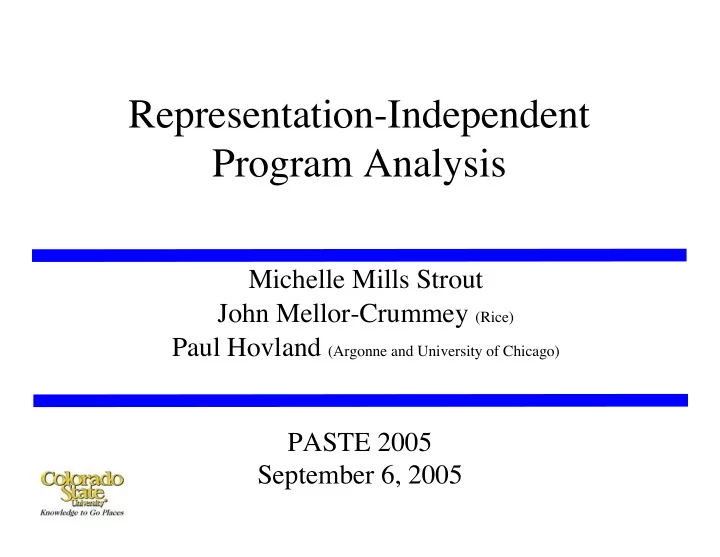

Representation-Independent Program Analysis Michelle Mills Strout John Mellor-Crummey (Rice) Paul Hovland (Argonne and University of Chicago) PASTE 2005 September 6, 2005
OpenAnalysis • Problem: Insufficient analysis support in existing compiler infrastructures due to non-transferability of analysis implementations • Decouples analysis algorithms from intermediate representations (IRs) by developing analysis-specific interfaces • Analysis reuse across compiler infrastructures - Enable researchers to leverage prior work - Enable direct comparisons amongst analyses - Increase the impact of program analysis research
Example Projects that Found Analysis Support Wanting • Run-time reordering transformations [Strout Thesis Work] - improves performance of irregular applications - needs data dependence relations with uninterpreted functions in compiler infrastructure for C • Caching policies in parallel file systems [Vilayannur] - estimates memory references in perfect loops with constant loop bounds - symbolic analysis would provide a better estimate, but was unavailable in the infrastructure being used • Hancock at AT&T [Fisher and Rogers] - domain-specific language for statisticians to manipulate transactions using a familiar notation - two researchers could not do the enormous amount of work to support domain-specific analysis of Hancock
Root Causes of Analysis Support Problem • Analysis development typically occurs in research compilers that have non-robust language support • Compiler infrastructures are difficult to support long- term and build robustly in academia • Some infrastructures have multiple branches because no mechanism for central updates • Most fundamental problem is that all compiler infrastructures integrate program analysis with program representation
Software Architecture for OpenAnalysis Clients Toolkit Intermediate Representation
Analysis-Specific Interfaces in OpenAnalysis • Represent imperative programming constructs with opaque handles: procedures, statements, memory references, expressions, operations, constants, etc. • Make queries on handles • Example: Control-flow graph analysis IRStmtType getStmtType(StmtHandle) SIMPLE, LOOP, STRUCT_TWOWAYCONDITIONAL, ...
OpenAnalysis Status Clients Toolkit Intermediate Representation
Key Differences from Related Work • Analysis frameworks, some IR-specific analysis - interprocedural analysis, FIAT [Hall et al 95] - data-flow analysis, Sharlit [Tijang & Hennessy 92] • Data-flow analysis generator, PAG [Alt and Martin 95] - must specify how to access entire IR • Conversion to a canonical IR - eg. data-flow analysis, requires aliasing info [Moonen 97] - difficult to map results back to source IR - must specify a mapping for entire IR • Analysis tools with adaptation level - GENOA [Devanbu 92], monolithic layer, assumes AST - StarTool [Hayes et al 00], analysis-centric, assumes AST
Evaluating OpenAnalysis • Ease of Use: how easy is it to ... - implement an analysis-specific IR interface? - contribute an analysis implementation to the toolkit? - use analysis results? • Coverage - how many important analysis algorithms are expressible? - how many imperative language features can be modeled? • Accuracy - how much is lost due to IR independence? • Efficiency - what is the performance cost of the extra layer of abstraction?
Conclusions • Language-independent program analysis enables sharing between and within compiler infrastructures • Analysis-specific, IR-independent interfaces are the key - represent complex language constructs with abstractions that are basic to all imperative programming languages - design the interface to satisfy a broad range of implementations • The OpenAnalysis toolkit is being actively used and further developed within the context of multiple projects (clients) for multiple IRs
Collaborators • Paul Hovland (Argonne) • John Mellor-Crummey (Rice University) • Barbara Kreaseck (La Sierra University) • Jean Utke (University of Chicago) • Nathan Tallent (Rice University) • Beata Winnicka (Argonne) • Boyana Norris (Argonne) • Brian White (Cornell) • Dan Quinlan (LLNL)
Recommend
More recommend